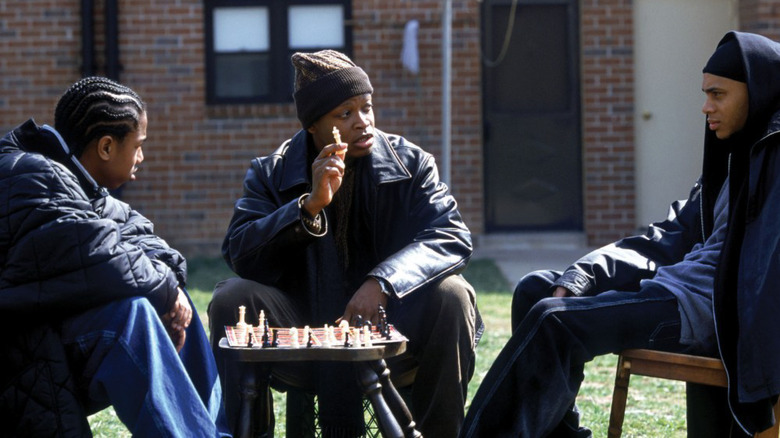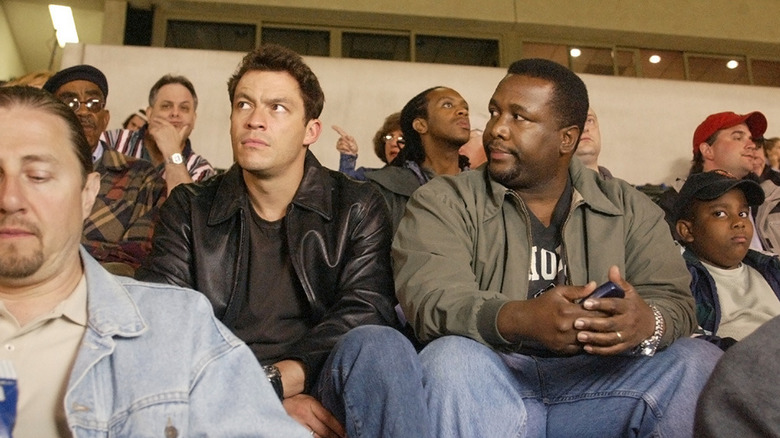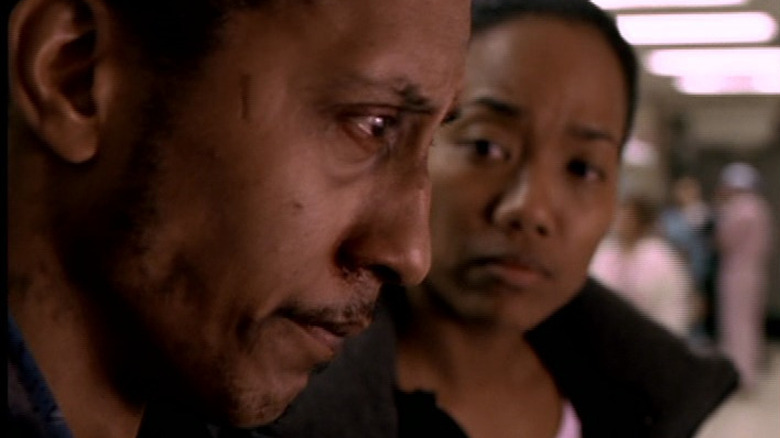Playing A Character On The Wire Was A Study In Paranoia
"Breaking Bad" had Walter White. "Mad Men" had Don Draper. "The Sopranos" had Tony. But when it came to HBO drama series "The Wire," the main player wasn't a man but a city in decline, another casualty of America's war on drugs. Each of its five seasons could be read as chapters in a grand novel, building up the macro by way of the micro. One season would focus on the empire of drug kingpin Avon Barksdale (Wood Harris), while the next season panned over to the Baltimore docks and its stevedores, custodians of illicit supply routes. New characters would surface mid-season, while entrenched players would fall to the bullet or the handcuffs. The seasonal whiplash had the cumulative effect of illustrating that the failed war on drugs wasn't due to this kingpin or that crooked senator, but a network of poorly-run institutions, just as creator David Simon intended.
Simon once described the show as "American dystopia," specific to post-industrial Baltimore but speaking to "what seemed like a condition of Western democracy." Whether observing the mechanics of Barksdale's evolving heroin/cocaine trafficking operation or the school system that propels its urban youth towards the street corner in one way or another, the big picture came from the collective experiences of a cadre of weighted characters, several based on real-life individuals Simon and co-creator/writer/producer Ed Burns had come to know during their respective runs with the Baltimore Police Homicide unit.
But the show's ever-rotating roster of characters had an added effect: Its cast didn't know if their respective role would survive the game from episode to episode. As Clarke Peters (who played Detective Lester Freamon on the show) is quoted as saying in The Guardian, "Nothing is ever guaranteed."
'People started disappearing and my paranoia kicked in'
After season 2's expansion to the docks, effectively claiming the entire city instead of one street corner as the arena for Simon's dystopia, the third season of "The Wire" returned to the human element that hooked viewers in season 1. The Barksdale organization and the BPD surveilling them were back (including Sonja John's detective Kima Greggs, who wasn't supposed to last beyond her season 1 stint), with new, leavening threads. The politics fueling the drug war stepped into the spotlight, as well as the emergence of a new gunslinger in town: The Stanfield organization, led by Marlo (Jamie Hector) and its aggressive enforcers. As the body count began to rise, so did the chances of ending up in the unemployment line if you were an actor on the show.
The Guardian quotes Clarke Peters:
"People started disappearing and my paranoia kicked in. I could pick up the script and someone might say: 'Did you hear what happened to Freamon the other night?' That was an ever-present specter. In hindsight, that's what living in Baltimore is like. You can catch a bullet filling up your car with gas."
It worked the other way around, too: Isiah Whitlock Jr., who filled the role of the unscrupulous senator Clay Davis, originally showed up for a brief stint in season 1, but found his character dealing with the Barksdale crew all the way through the final season.
"Initially, I just thought I was going to do a couple of episodes. I had no idea where it was headed. It was quite a ride."
All part of the game
Brett Martin's 2013 chronicle "Difficult Men" meanders in and out of the writers' rooms of the Third Golden Age of television's prestige dramas from "Oz" to "Homeland." Its coverage of "The Wire" paints a picture of actors turned into "forensic Kremlinologists," analyzing each set of script pages as they came in for any signs that their character would be the next to get got. Andre Royo, who played recovering addict Bubbles on the show, recalls being suspicious of too much screen time:
"Every time you read the script, you're looking for a hint: if too much of your story is being told. 'Oh s***, they're building it up. I'm gonna go.' David had a problem with telling people how they were gonna die. He'd never just say, 'Look, you're gonna die.' There was always this weird energy."
The anxieties on set were worsened by loose communication with the showrunners. Seth Gilliam, who took on the role of Lieutenant Carver on the series, found himself relegated to the sidelines by the time the narrative swung back around to the BPD in season 3, comparing the experience to being signed to the New York Yankees only to sit on the bench so that you're no longer a threat to their record. When Larry Gilliard Jr. ran into Simon on the season 2 set one day, he found out haphazardly that his character D'Angelo Barksdale, heir apparent to his uncle's empire in the first season, wouldn't be earning a paycheck for much longer.
Simon had run into him on set and said, 'You're going to love the stuff I wrote for you this episode.' 'Great!' said Gilliard. 'I mean, it's probably your last episode...,' said Simon.
It's a tough part of the game, but in this urban Greek tragedy, Frankie Faison's exhausting bureaucrat Ervin Burrell has the most succinct attitude, reflecting the show's ethos: "The gods will not save you."


